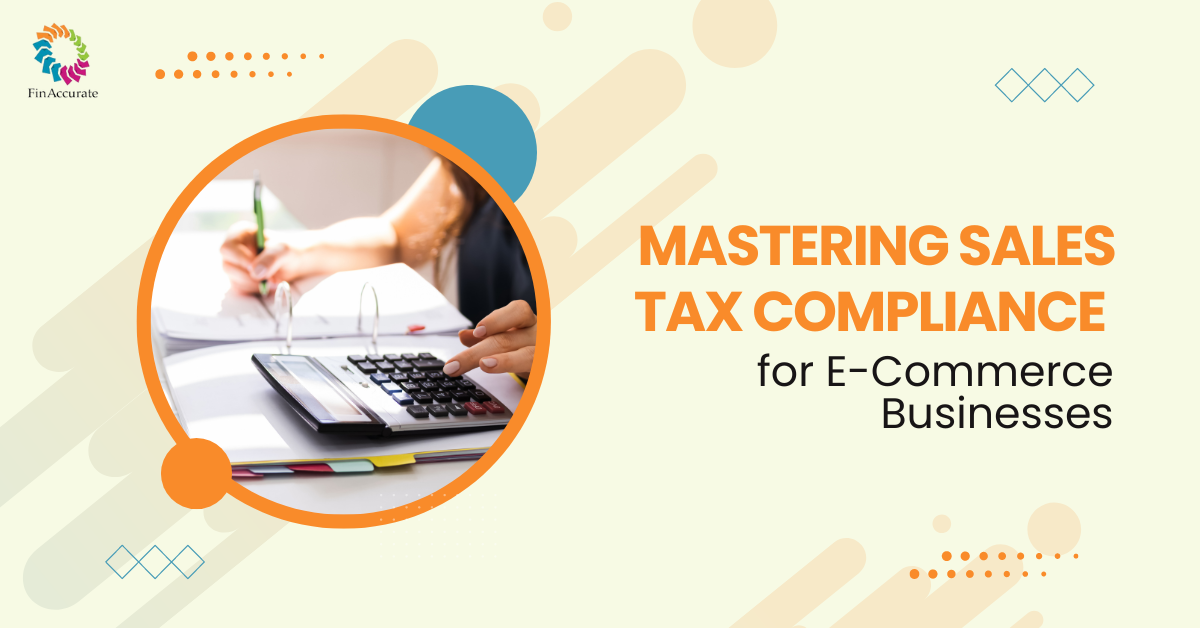In 2023, mastering sales tax compliance for e-commerce businesses is crucial, but it can be challenging to keep up with ever-changing laws. Even experienced entrepreneurs find it tough to navigate through the maze of regulations, especially with new legislation being introduced. This complexity is magnified when dealing with customers from different states. Don’t worry, we’ve got you covered! In this blog, we’ll break down interstate sales tax regulations and share practical tips to stay ahead of the game. Plus, we’ll highlight common mistakes to avoid. Get ready to ace your sales tax compliance and thrive in the world of e-commerce!
What is E-commerce Sales Tax?
E-commerce sales tax is the tax that businesses must charge online customers and receive from them. The way e-commerce sales tax works is the same as when a customer buys something in a shop and has to pay a tax on top of the price.
Even though it is often called “online sales tax,” “e-commerce sales tax,” or even “internet sales tax,” these names aren’t always accurate. The truth is that there is no special tax that only applies to sales made online.
Instead, tax law has just been changed to reflect the fact that we live in a digital world and that doing business in a state no longer requires having a store, factory, or office there.
Whether you have to receive and send these payments depends on a number of things, such as where the sale took place and whether you have a “nexus” with the state. (“Nexus” means that a business has enough business in a state to have to pay taxes there.)
Also Read: Mastering Sales Tax Compliance for E-Commerce Businesses
A Brief History of the Sales Tax on Online Purchases
E-commerce sales tax refers to the tax levied on online purchases made from out-of-state businesses. This term emerged after a Supreme Court ruling in the 1990s that exempted remote sellers from collecting and paying sales tax in states where they didn’t have a physical presence. This ruling benefited Amazon, which was able to grow without tax regulations, attracting more customers looking to save money on tax-free purchases. As e-commerce grew, so did the complexity of sales tax regulations, with over 12,000 sales tax jurisdictions in the US.
In reality, consumers are supposed to pay use tax on these sales, but almost none did. Sales tax revenue losses amounted to billions.
Yet, every bill that tried to change the way sales tax is collected to allow it to be collected from remote retailers—like the Marketplace Fairness Act, which was introduced in 2011, 2013, and 2015—ran into too much trouble to even get to the desk of the US president to be signed or vetoed.
The waves finally turned in 2018, when e-commerce sales in the US hit $504.6 billion. The South Dakota v. Wayfair decision, which reversed the 1992 Quill decision, came out at that time. States would be able to charge sales tax to companies that didn’t have a real location in the state for the first time.
How Does the Sales Tax Nexus Affect Businesses that Sell Things Online?
A sales tax nexus determines the relationship between a business and a taxing jurisdiction. For physical stores, this is easy, as the store’s presence establishes the relationship. However, a 2018 Supreme Court ruling in South Dakota v. Wayfair Inc. changed how e-commerce businesses collect and remit sales tax. Even if a business doesn’t have a physical presence in a state, it can now be forced to collect sales tax by that state.
Here’s what you need to know about the sales tax nexus.
1. Different states have different rules about sales tax contact
Each state has its own rules about how many sales or deals a seller can make before they have to start collecting tax. For example, South Dakota can require any company that sells more than $100,000 worth of goods or services or has more than 200 transactions a year to collect and pay sales tax. Other states have their own rules about how to collect sales tax and send it to the government.
2. Businesses that sell in more than one state need to know what each state’s rules are
For businesses that could sell goods to customers in all 50 states, it can be hard to figure out how much sales tax to charge, if any, and how to send the tax to the right taxing body.
If your small business mails a customer across the country three $15 items, you probably don’t have to worry too much about sales tax rules. It’s unlikely that any state will make a rule that says people have to pay sales tax on small, occasional sales.
But businesses that sell more than a certain amount must pay attention to local and state rules.
3. The sales tax link is based on a number of things
Each state has a different sales tax link. How it’s decided can depend on a number of things, such as:
- Employees
- Headquarters
- Where things are kept.
- Amount of goods sold to or in a certain state
Because laws about e-commerce sales tax are always changing, you need to check the requirements on each state’s website to make sure you are following the rules.
Also Read: 5 Mistakes Avoid With Business Tax Return
Tips for Managing E-commerce Sales Tax
Managing sales tax for online shopping takes work, teamwork, and help. These tips can help online stores keep up with state rules, collect sales tax, and send it to the right tax authorities.
1. Keep Track of Every Penny — Literally
Luca CM Melchionna, a managing member of Melchionna PLLC, said that keeping detailed records is one of the best ways to stay on top of your sales tax responsibilities. The best accounting software lets you keep track of bills and sales so that you know exactly where your sales come from.
Melchionna said, “Make sure to work with a lawyer and a CPA who have experience in this area.” “In many places, you have to report sales tax on a regular basis. At the time of each sale, it’s important for small sellers to keep good records.
2. Keep Track of the due Dates for each state
When you have to send back the sales tax you collect on online purchases depends on the state. Make a calendar or mark one that you already have with the due date for each state to make sure funds get to the right people on time.
“When you register with a state, you should be given a filing frequency,” said Scott Peterson, vice president of U.S. tax policy and government relations at Avalara. This could be monthly, quarterly, annually, or something else. “Each of these bands has its own due date. Even though the due date may be the same day of the month each time, it can change because of holidays, weekends, and other things. So, it’s important to double-check the times instead of just assuming you know when they are.
3. Understand How to Pay Sales Tax
Each state has its own rules about how to file and pay sales tax for online purchases. Some may let you pay with a check, while others require you to pay online. Make sure you know what you have to do so you don’t get any shocks when it’s time to file.
4. If you need to, apply for a sales tax permit
If you’re close to hitting a state’s minimum sales threshold, you should apply for a sales tax permit before you reach that threshold. Before you can charge people sales tax, you need to sign up for a sales tax permit. It takes a lot of work to get permits in different states, but it’s important to know the sales tax rules in each state where you do business and follow them.
5. Know what will happen if you make a mistake or are late
Just as important as knowing the law is knowing the fines for late or wrong payments in each state. Even if you break the law by chance, it could hurt your business in the long run and even lead to legal action.
6. Consult a professional
If you don’t know what your tax obligations are in a certain state, talk to a tax professional, CPA, or lawyer. Their advice can help you make the best choices for your e-commerce business and make sure you’re getting and sending back the right amount of sales tax. They can also give you advice on how to take advantage of tax breaks for which you qualify.
Mistakes to Avoid With Compliance
“We all make mistakes,” said Peterson. “If you run a small business, it’s easy to file sales taxes. After all, it’s likely that you don’t know a lot about sales tax.”
Peterson talked about three mistakes that small businesses often make when they collect sales tax.
1. Failing to keep track of different sales tax rules for different states
As was already said, each state has its own laws and rules. You might have to deal with a lot of different due dates, how often you have to file, forms, late fees, and other things, and it’s easy to get them all mixed up.
States continue to change rules for political reasons and due to pressure from groups. For example, in 2022, diapers no longer had to be taxed in Louisiana. Also in 2022, the sales and use tax on mobile houses in Florida went down from 6% to 3%.
“Making sure you get it right for each state also means keeping up with the latest requirements, which can and do change,” Peterson said.
2. Giving out the wrong sales tax numbers
Many states require you to break down collections by the local authority, which adds another layer of complexity. Peterson said that you have to carefully count and check your numbers to make sure they are right.
You also need to make sure you figure out the right amount of the sale that is subject to sales tax. For instance, some states put taxes on food while others don’t.
3. Not filing because you didn’t make any money from taxes
Don’t think that if you didn’t collect tax you don’t have to file for that reporting period. Most states want you to file every reporting period, even if you didn’t collect anything. If you don’t follow this rule, you could get fined for being late or not filing at all.
Also Read: Tax Changes Affecting Businesses from the American Rescue Plan Act
What’s Next for Sales Tax for E-commerce?
Since the South Dakota v. Wayfair decision in 2018, many changes have been made to how sales tax is collected on online purchases. Changes are likely to keep happening, so it’s important for your business to keep up.
Even though it might seem hard for small business owners to keep up with sales tax changes in all 50 states, they can do so if they take care of their sales tax tasks and stay informed.
You can make sure your business is in line with ever-changing tax codes by staying organized, doing ongoing studies on changes to state laws, buying software programs if needed, and registering for sales tax permits in each state where needed. Having peace of mind that you’re taking care of your sales tax properly can let you focus on running and growing your business.
Sales tax compliance is an essential aspect of running an e-commerce business, with complex regulations and potential penalties for non-compliance. However, with the right tools and knowledge, mastering sales tax compliance is achievable. In this blog, we’ve covered the key concepts and best practices to help e-commerce businesses navigate the ever-changing landscape of sales tax regulations. From understanding the sales tax nexus to choosing the right software solutions, this blog has provided valuable insights and resources to help businesses stay compliant. By staying up-to-date with sales tax regulations and implementing the best practices discussed in this blog.
Editor’s Choice:
The Benefits of Cloud-Based Accounting for Small Businesses
2. Cryptocurrency and Taxes: What You Need to Know
3. How Artificial Intelligence is Revolutionizing Accounting Industry
4. The Future of Financial Management: Trends to Watch in 2023
5. Sustainability Accounting: The Key to Building a Greener Business
6. Corporate Social Responsibility Accounting: A New Era of Transparency





